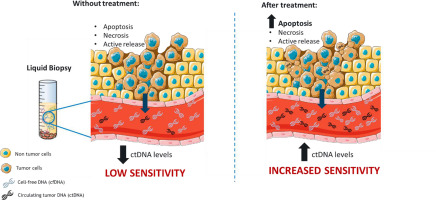当前位置:
X-MOL 学术
›
Eur. J. Cancer
›
论文详情
Our official English website, www.x-mol.net, welcomes your
feedback! (Note: you will need to create a separate account there.)
Induction of apoptosis increases sensitivity to detect cancer mutations in plasma.
European Journal of Cancer ( IF 7.6 ) Pub Date : 2020-01-31 , DOI: 10.1016/j.ejca.2019.12.023 Joana F Marques 1 , Susana Junqueira-Neto 2 , Jorge Pinheiro 3 , José C Machado 2 , José L Costa 2
European Journal of Cancer ( IF 7.6 ) Pub Date : 2020-01-31 , DOI: 10.1016/j.ejca.2019.12.023 Joana F Marques 1 , Susana Junqueira-Neto 2 , Jorge Pinheiro 3 , José C Machado 2 , José L Costa 2
Affiliation

|
BACKGROUND
The study of cell-free DNA (cfDNA), namely the fraction derived from tumors (ctDNA), is a clinically relevant noninvasive biomarker for cancer management. However, the intrinsic low abundance of ctDNA in plasma limits its implementation in the clinic.
AIM OF THE STUDY
In this study, the objective was to demonstrate that induction of apoptosis-the major source of ctDNA-increases ctDNA concentration, thereby increasing the sensitivity to detect clinically relevant mutations in plasma.
METHODS
In vitro models were used to test the effect of docetaxel on the release levels of DNA from lung cancer cells. In vivo, Rag2-/-IL2rg-/- immunodeficient C57BL/6 xenografted mice were treated with docetaxel for 24 h or 48 h. Tumor tissue and blood were collected to evaluate the levels of apoptosis DNA release levels, respectively.
RESULTS
We observed increased levels of apoptosis in H1975 cells and a consequent increase in cfDNA released into the culture medium after docetaxel treatment. In vivo, the results show increased cfDNA concentration in plasma of xenografted mice after apoptosis stimulation. Importantly, treatment increased the sensitivity of detection of relevant cancer mutations, namely 24 h after treatment.
CONCLUSION
This study provides new insights regarding the importance of timing for blood collection. In our experimental model, we demonstrate that blood collection should be performed 24 h after treatment (apoptosis induction), for optimal ctDNA analysis. Translating these results into the clinical setting is likely to increase sensitivity to detect tumor-derived mutations in plasma, might help guide the therapeutic decision, and optimize current liquid biopsy procedures for situations where tissue analysis is not possible.
中文翻译:

凋亡的诱导增加了检测血浆中癌症突变的敏感性。
背景技术无细胞DNA(cfDNA),即来源于肿瘤的部分(ctDNA)的研究是临床上与癌症相关的非侵入性生物标记。但是,血浆中ctDNA固有的低丰度限制了其在临床中的实施。研究目的在本研究中,目的是证明诱导凋亡(ctDNA的主要来源)增加了ctDNA的浓度,从而提高了检测血浆中临床相关突变的敏感性。方法采用体外模型测试多西紫杉醇对肺癌细胞DNA释放水平的影响。在体内,用多西紫杉醇处理Rag2-/-IL2rg-/-免疫缺陷的C57BL / 6异种移植小鼠24小时或48小时。收集肿瘤组织和血液以分别评估凋亡DNA释放水平。结果我们观察到多西他赛治疗后H1975细胞凋亡水平增加,并且释放到培养基中的cfDNA增加。在体内,结果显示凋亡刺激后异种移植小鼠血浆中的cfDNA浓度增加。重要的是,治疗提高了检测相关癌症突变的敏感性,即治疗后24小时。结论这项研究提供了有关定时采血的重要性的新见解。在我们的实验模型中,我们证明应在治疗后24小时(诱导细胞凋亡)进行血液采集,以实现最佳ctDNA分析。将这些结果转化为临床结果可能会提高检测血浆中肿瘤衍生突变的敏感性,可能有助于指导治疗决策,
更新日期:2020-01-31
中文翻译:

凋亡的诱导增加了检测血浆中癌症突变的敏感性。
背景技术无细胞DNA(cfDNA),即来源于肿瘤的部分(ctDNA)的研究是临床上与癌症相关的非侵入性生物标记。但是,血浆中ctDNA固有的低丰度限制了其在临床中的实施。研究目的在本研究中,目的是证明诱导凋亡(ctDNA的主要来源)增加了ctDNA的浓度,从而提高了检测血浆中临床相关突变的敏感性。方法采用体外模型测试多西紫杉醇对肺癌细胞DNA释放水平的影响。在体内,用多西紫杉醇处理Rag2-/-IL2rg-/-免疫缺陷的C57BL / 6异种移植小鼠24小时或48小时。收集肿瘤组织和血液以分别评估凋亡DNA释放水平。结果我们观察到多西他赛治疗后H1975细胞凋亡水平增加,并且释放到培养基中的cfDNA增加。在体内,结果显示凋亡刺激后异种移植小鼠血浆中的cfDNA浓度增加。重要的是,治疗提高了检测相关癌症突变的敏感性,即治疗后24小时。结论这项研究提供了有关定时采血的重要性的新见解。在我们的实验模型中,我们证明应在治疗后24小时(诱导细胞凋亡)进行血液采集,以实现最佳ctDNA分析。将这些结果转化为临床结果可能会提高检测血浆中肿瘤衍生突变的敏感性,可能有助于指导治疗决策,











































 京公网安备 11010802027423号
京公网安备 11010802027423号